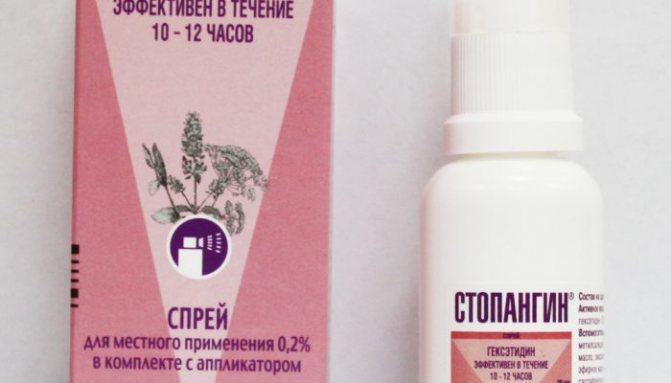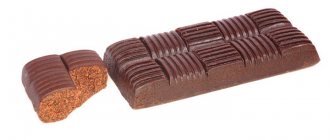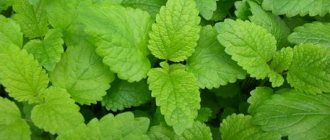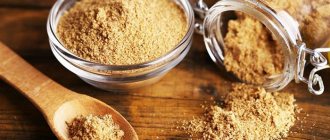Sudden pain in the throat is a situation familiar to almost everyone. Inflammation of the pharynx brings a lot of trouble to adults and children. Therefore, everyone wants to get rid of it as quickly as possible, which cannot be achieved without the use of medications. An ENT doctor has many of them in his arsenal; for example, Stopangin is one of the effective remedies in the fight against diseases of the throat and oral cavity. How it is characterized, how it is taken, whether the drug can be used during pregnancy, breastfeeding and in children - these issues need to be dealt with in detail.
Action
The multicomponent composition of the drug determines a wide range of its therapeutic effects. As mentioned above, the main active ingredient is hexetidine, a local antiseptic. It is a pyrimidine derivative and is able to replace vitamin B1 (thiamine) in microbial cells, preventing their growth and reproduction. Hexetidine also inhibits the synthesis of components used by fungi to build their protective shell. The drug substance is active against many pathogens: streptococci, staphylococci, pneumococci, mycobacteria, Klebsiella, Escherichia coli and Pseudomonas aeruginosa, Proteus, Candida and even some viruses. And repeated use of hexetidine is not accompanied by the development of resistance mechanisms.
Methyl salicylate inhibits the synthesis of cyclooxygenase, an enzyme that induces inflammatory reactions in tissues through the formation of prostaglandins. This also helps reduce pain. Under the influence of the substance, blood flow in the mucous membranes and tissue trophism increase due to the local irritant effect. Thus, the main effects of Stopangin can be considered:
- Antibacterial.
- Antifungal.
- Antiviral.
- Anti-inflammatory.
- Anesthetic.
In addition, hexetidine has the ability to stop capillary bleeding, and the essential oils included in the drug complement and enhance the above effects. They also soften and envelop the inflamed mucous membrane, relieve swelling, which alleviates the condition of patients: reduces the feeling of discomfort and promotes faster recovery. The medicine also has deodorizing properties, eliminating bad breath.
The drug induces a complex of positive effects that help fight infectious inflammation and its symptoms.
Sore throat and breastfeeding
Acute tonsillitis in nursing mothers occurs no less often than in other adults, and even more often. During lactation, women are concerned about many issues. For example, how to treat sore throat while breastfeeding (BF)? Is it possible to breastfeed a child with an infectious disease if you are taking antibiotics?
Sore throat is of viral, bacterial or fungal origin. Hypothermia, lack of nutrients and vitamins weaken the protective functions of the immune system. Viral sore throat most often affects adults in the cold season, accompanied by chills, sore throat, sore throat, and dry cough (in the first hours and days of the disease).
Hypothermia and hormonal disorders contribute to the activation of bacteria. Microbial tonsillitis with hepatitis B often occurs as a complication of a viral infection. Symptoms appear within 3 days after the onset of increased proliferation of streptococci and staphylococci.
The main signs of bacterial tonsillitis:
- high body temperature (38–39°C and above);
- white or yellowish coating in the throat;
- enlargement and redness of the tonsils;
- pain when swallowing;
- headache;
- weakness.
The appearance of pus on the surface of the tonsils is associated with an inflammatory process. Microbial toxins enter the bloodstream and poison the body. The immune system fights infection, which is manifested by fluctuations in body temperature, headaches and muscle pain, and swollen lymph nodes.
Indications
The main scope of application of Stopangin spray or solution is the treatment of infectious and inflammatory diseases of the throat and oral cavity. These include the following conditions:
- Sore throats.
- Tonsillitis.
- Pharyngitis.
- Stomatitis.
- Gingivitis.
- Periodontitis.
- Glossitis.
- Candidiasis (thrush).
In addition, the drug is successfully used as a prophylactic agent to prevent the development of microbial inflammation: after tooth extraction and surgical interventions, for injuries and destructive tumors. Routine oral hygiene is another indication for using the medication.
Application
The use of Stopangin in various situations concerns many people. It should immediately be noted that the advisability of taking any medicine, even one that has only local effects, is determined by the doctor. Therefore, without the intervention of a specialist, it is difficult to understand how to use an aerosol or solution in children, whether Stopangin can be used during pregnancy and breastfeeding.
Method of administration
How to use the medicine is reflected in the instructions, but only a doctor will provide additional information. Regardless of the form chosen, the drug is used between meals or after meals. The solution is intended for rinsing - in the amount of one tablespoon for 30 seconds. It can also be used in the form of applications: the medicine is applied to damaged areas with a cotton pad (especially convenient for young children). This is carried out up to 5 times a day, maintaining an interval between procedures of at least 4 hours. Do not swallow the solution.
Stopangin spray is used differently. The protective cap is removed from the bottle and the sprayer is put on. It should be pressed several times so that the medicine enters the applicator and a stable aerosol is obtained. The drug is irrigated into the throat or each tonsil separately two to three times. At this time, you need to hold your breath so as not to accidentally inhale the sprayed solution. In addition, contact of the drug with the eyes should be avoided. Children under 8 years of age may have difficulty using the spray, so treatment is carried out through applications (rinses). The therapeutic course is usually 7 days, unless the doctor indicates otherwise.
Before treatment with the drug, you should carefully read the information about how to use the spray or solution so that there are no misunderstandings later.
Side effects

In most cases, Stopangin is well tolerated. But sometimes side effects are still possible, which are expressed in the following reactions on the part of the patient:
- Local (burning at the site of application).
- Allergic (redness, itching, swelling, rash).
- Dyspeptic (vomiting when swallowed).
These effects are observed quite rarely. Allergies are mainly associated with the individual hypersensitivity of the body to the drug, and other phenomena resolve on their own and do not require additional correction.
Pregnancy and lactation
And although the medicine does not have a direct teratogenic and embiotoxic effect, during pregnancy Stopangin can be taken in the second and third trimesters, when the fetus has already formed the main vital systems. The drug is also safe during breastfeeding (BF) because it does not pass into human milk. But in these cases, treatment with the drug should be carried out only under the supervision of a doctor.
Stopangin by trimester
1st trimester
The use of the drug is prohibited due to its strong teratogenic effect on the fetus.
2nd trimester
Use with caution, under medical supervision.
3rd trimester
The use of Stopangin is possible only at the beginning of the trimester; in the last weeks of pregnancy, the drug must be discontinued.
In this article you can read the instructions for use of the drug Stopangin
. Reviews of site visitors - consumers of this medicine, as well as the opinions of specialist doctors on the use of Stopangin in their practice are presented. We kindly ask you to actively add your reviews about the drug: whether the medicine helped or did not help get rid of the disease, what complications and side effects were observed, perhaps not stated by the manufacturer in the annotation. Analogues of Stopangin in the presence of existing structural analogues. Use for the treatment of sore throat, pharyngitis and stomatitis in adults, children, as well as during pregnancy and lactation. Composition of the drug.
Stopangin
- antiseptic for topical use in dentistry and ENT practice. It also has antifungal activity and analgesic effect when applied to the mucous membrane. In addition, Stopangin has an enveloping effect.
Duration of action - 10-12 hours.
Compound
Hexethidine + excipients (Solution and Spray).
Benzocaine + Tyrothricin + excipients (Tablets 2A and Forte).
Pharmacokinetics
Data on the pharmacokinetics of the drug Stopangin are not provided.
Indications
- infectious and inflammatory diseases of the oral cavity, throat and larynx (tonsillitis, including Vincent's tonsillitis, pharyngitis, stomatitis, aphthous ulcers of the oral cavity, glossitis, periodontitis, bleeding gums);
- fungal diseases (candidiasis) of the oral cavity and larynx before and after surgical interventions on the oral cavity and larynx;
- injuries of the oral cavity and larynx;
- prevention of infection of the alveoli after tooth extraction;
- oral hygiene to eliminate bad breath (deodorant);
- prevention of superinfection in destructive tumors of the oral cavity and larynx.
Release forms
Solution for topical use 0.1% (sometimes mistakenly called syrup).
Spray for topical use 0.2% (sometimes mistakenly called an aerosol).
Lozenges 2A and 2A Forte.
Instructions for use and usage diagram
Solution
The solution is used undiluted for rinsing the mouth - 10-15 ml (1 dessert or tablespoon) for at least 30 seconds 2 times a day. You can also lubricate the oral mucosa using a cotton swab on a stick. This method of administration is advisable for use in children.
The solution should be used after meals or between meals.
The duration of treatment with Stopangin is 5-7 days.
Spray
The spray is used 2 times a day (unless the doctor prescribes otherwise), after meals or in between meals.
Before use, remove the protective cap from the bottle and attach the applicator. Press 2-3 times so that the solution enters the sprayer. Then hold your breath and spray on the affected area. After use, the applicator should be rinsed with warm water.
Lozenges
1 tablet every 2-3 hours. The tablet must be slowly dissolved in the mouth. The duration of treatment should not exceed 5 days.
Side effect
- burning sensation of the oral mucosa;
- swelling of the mucous membrane of the mouth or pharynx;
- allergic reactions;
- nausea.
Contraindications
- atrophic pharyngitis;
- children's age up to 6 years (for solution), up to 8 years (for spray), up to 18 years (for tablets);
- 1st trimester of pregnancy;
- hypersensitivity to the components of the drug.
Use during pregnancy and breastfeeding
The drug is contraindicated for use in the 1st trimester of pregnancy.
It is possible to use the solution and aerosol in the 2nd and 3rd trimesters of pregnancy and during lactation (breastfeeding).
Stopangin 2A and 2A Forte (tablets) are contraindicated during pregnancy and lactation (breastfeeding).
Use in children
The drug Stopangin in the form of a solution for topical use can be prescribed to children from an age when there is no danger of uncontrolled swallowing of the drug.
Parents should be warned that if a child accidentally takes the drug orally, they should consult a doctor.
special instructions
The patient should be warned about the need to consult a doctor in the following cases: if unusual reactions occur when using the drug; in case of deterioration of health, increase in body temperature, ineffectiveness of medical procedures; if necessary, simultaneous use of the drug Stopangin with other drugs; in case of overdose.
The advisability of simultaneous use of the drug Stopangin with other drugs is determined by the doctor.
The topical solution contains 4% ethanol (alcohol).
Impact on the ability to drive vehicles and operate machinery
Patients taking Stopangin should refrain from driving vehicles for 30 minutes after its use.
Drug interactions
Benzocaine, due to the formation of its metabolite 4-aminobenzoic acid, reduces the antibacterial activity of sulfonamides and aminosalicylates.
Analogues of the drug Stopangin
Structural analogues of the active substance:
- Hexoral;
- Hexethidine;
- Maxisprey;
- Stomatidin.
Analogs for therapeutic effect (medicines for the treatment of acute pharyngitis):
- Azitral;
- AquaMaris Strong;
- Amoxiclav;
- Hexapneumin;
- Hexaspray;
- Glycodin;
- Grammidin;
- Doxycycline;
- Zinnat;
- Imudon;
- IRS 19;
- Yox;
- Klacid;
- Clindamycin;
- Coldrex;
- Laripront;
- Morenasal;
- Nalgesin;
- Ospamox;
- Pinosol;
- Rapiklav;
- Ribomunil;
- Sebidin;
- Septolete;
- Septolete plus;
- Strepsils;
- Sumamed;
- Sumamox;
- Tranexam;
- Trifamox IBL;
- Falimint;
- Fromilid;
- Furasol;
- Tsiprolet;
- Erythromycin;
- Unidox Solutab.
If there are no analogues of the drug for the active substance, you can follow the links below to the diseases for which the corresponding drug helps, and look at the available analogues for the therapeutic effect.
3501 03/06/2019 4 min.
Sore throat is a common disease among children and adults. Here you can read about the symptoms of a sore throat. Today it is not so easy to find a medicine that would effectively eliminate all inflammatory processes occurring in the oral cavity. But most doctors, when drawing up a treatment regimen for sore throat, stomatitis and various mouth injuries, prescribe a drug such as Stopangin. The main advantages of such a medicine are its effectiveness, low price, and absolutely safe effect on the body.
Restrictions
Considering the features of the drug, one cannot fail to mention those factors that limit its use. They should be taken into account by the doctor at the stage of the initial examination, before forming a treatment program. Possible concomitant diseases and body condition, concurrent use of other medications - all this can affect the effectiveness of the drug and its safety.
Contraindications

For Stopangin spray, the instructions for use contain information about those cases in which it is better to abandon the drug. These include:
- Individual intolerance.
- Atrophic pharyngitis.
- Pregnancy in the first trimester.
- Children's age up to 6 years.
It must be remembered that the medicine in the form of a spray can only be used from the age of 8, because it is difficult for younger children to use the aerosol form correctly (not to resist and hold their breath).
Taking into account contraindications is a necessary aspect of preliminary preparation for the use of any medicine.
How to treat sore throat while breastfeeding
The birth of a child is a responsible, important stage in life for every woman. Often after childbirth, the immune system suffers from minor disruptions due to stressful situations, constant physical activity and poor nutrition. At this moment, the woman’s body is susceptible to rapid infection by viruses and bacteria. Let's look at how to treat sore throat while breastfeeding.
What is the danger of sore throat during lactation?
The disease occurs with the release of toxic compounds into the body, related to the waste products of harmful microorganisms. If the response is incorrect or untimely, the disease can cause significant harm to the body, leading to irreversible consequences:
- purulent abscess;
- cervical lymphadenitis;
- rheumatism;
- meningitis;
- otitis;
- chronic tonsillitis.
The most terrible consequences:
- damage to the cardiovascular and musculoskeletal systems;
- kidney dysfunction.
As a result, you can become disabled. Complications arise due to improper or untimely treatment, additional infection and a weak immune system. The danger arises for mother and baby, since beneficial and harmful compounds are transmitted through breast milk. Treatment of sore throat in a nursing mother is carried out immediately.
Signs of the disease
Acute tonsillitis or sore throat is caused by streptococcus and staphylococcus bacteria. The presence of a viral infection provokes the proliferation of harmful microflora in the oral cavity, which causes bacterial tonsillitis.
There are several ways of transmitting the disease - airborne, household. It mainly affects a weakened organism with low protective barriers. The greatest likelihood of developing acute sore throat is hypothermia, a tendency to form inflammation in the respiratory tract.
Main symptoms of the disease:
- elevated temperature;
- painful sensation when swallowing food or liquid;
- lymph nodes are enlarged, pain occurs under the lower jaw;
- lethargy, general malaise;
- sweating is high;
- cutting pain radiating to the neck or ear;
- muscle and joint aches;
- purulent discharge;
- swollen tonsils.
Signs of a sore throat can be confused with a cold, but tonsillitis lasts much longer and is more severe.
Depending on the symptoms, the disease is divided into 7 types:
- Catarrhal tonsillitis - it is caused by an infection that is transmitted by airborne droplets. It is characterized by pain when swallowing, redness and swelling of the tonsils. It goes quickly and easily.
- Follicular type - the follicles are affected, accompanied by the discharge of pus.
- Lacunar tonsillitis - the disease occurs in the area of the lacunae. It develops rapidly, the temperature rises to 40C. Severe sore throat. The patient's condition is serious. Dangerous due to possible complications: otitis media, convulsions, suffocation, conjunctivitis.
- Fibrinous tonsillitis is usually a complication after follicular or lacunar tonsillitis. The plaque has already spread throughout the entire oral cavity. Complications include possible brain damage.
- Phlegmonous tonsillitis is rare. The causative agent is the Coxsackie virus, most often transmitted by airborne droplets. Fever and a strong increase in temperature up to 39-40C, as well as a flu-like condition, pain in the abdomen, purulent blisters on the tonsils and palate. The duration of the illness is up to two weeks.
- Monocytic tonsillitis - the cause of the disease is not clear, but there is a theory that the causative agent of this tonsillitis is the Epstein-Barr virus, which is transmitted by airborne droplets and contact. Symptoms: sore throat, swollen lymph nodes, yellow plaque on the tonsils, sudden increase in temperature.
- Allergic – more common in people who live in very cold climates or in areas with developed industry and unfavorable environmental conditions. In addition to the main symptoms, this sore throat may also be accompanied by cough, hoarseness, and bad breath. Complications such as suffocation are possible.
Chronic tonsillitis is when inflammatory processes occur regularly. They fade away and then resume.
Features of the treatment of sore throat with hepatitis B
Having noticed the first symptoms of tonsillitis, you need to visit your personal doctor for an initial examination and diagnosis. Treatment of sore throat during breastfeeding will not be complete without prescribing antibiotics.
Tests can confirm a temporary diagnosis. A culture is taken from the oral cavity to check for the presence of bacteria. Laboratory testing allows you to detect streptococcus and, accordingly, select a suitable drug to reduce the concentration of pathogenic microflora. Additionally, the doctor prescribes a blood test.
The results of laboratory tests can determine the type of disease and prescribe the required medications. It is important that the composition of the drugs is effective for the woman and does not harm the baby.
Komarovsky O.E states that in order to treat a sore throat in a nursing mother, it is additionally required to adhere to certain rules. Let's look at each in more detail.
Bed rest
If you have breastfeeding, you won’t be able to stay in bed all the time. The child is small and requires regular attention and care from the mother.
When tonsillitis occurs, it is important that loved ones are nearby at the right time. It is not worth overloading the body physically; it is better to leave strength for a speedy recovery.
In the absence of malaise or fever, a short stay of the patient in the fresh air will benefit.
Drinking and nutrition
Regular fluid intake during a sore throat while breastfeeding is necessary for the mother. Warm tea, fruit drinks at room temperature, low-fat broths, herbal infusions improve a person’s condition by removing infection from the body and lowering body temperature. In addition to eliminating pathogens, the liquid stimulates lactation and increases the production of breast milk.
It is equally important to observe the temperature regime of the drinks consumed. They should not be hot or cold. Optimally - warm (40-50C), allowed drink: compote of dried fruits or fresh apples; infusion of rose hips; fruit juice from sweet and sour fruits; fruit or berry jelly consisting of hypoallergenic ingredients; herbal teas.
It is necessary to choose a drink based on the individual characteristics of the child in order to prevent the development of allergies. When consuming herbs, it is important to know which components reduce and increase lactation.
It is not recommended to include lemon, honey products, and sage in your diet.
Speaking about food, it is worth using a gentle regime:
- vegetable puree soup;
- milk porridge;
- chicken bouillon.
It is worth removing fatty foods, canned foods, spices, and flavor enhancers from your diet.
Rinse
For the treatment of sore throat during breastfeeding, an equally important procedure is rinsing, carried out at the first symptoms. Frequent treatment of the tonsils allows you to effectively and quickly remove bacteria and dead cells from the oral cavity.
The time interval between procedures is no more than 2 hours. You can use disinfectants, decoctions of medicinal herbs that have anti-inflammatory and analgesic properties.
It is recommended to brush your teeth after every meal to prevent the development of stomatitis.
Sprays, aerosols
Local treatment involves the use of sprays and aerosols for treating the oral cavity. Let's consider the approved and fast-acting remedies during breastfeeding for tonsillitis:
- Stopangin is an antiseptic spray. Use twice a day after meals;
- Bioparox is an aerosol for inhalation. Relieves inflammation, kills bacteria. Dosage – 4 injections into the mouth 4 times a day;
- Tantum Verde - spray. Treatment is carried out in 4-7 injections every 3-6 hours;
- Hexoral is an aerosol. Disinfect the oral cavity in the morning and evening, 1 dose;
- Inhalipt - spray is sprayed 2-3 times up to 4 times a day;
- Kameton – spray, aerosol. From 2 to 4 sprays in different directions of the throat. Treatment is carried out 4 times per day.
In addition, you can use solutions for lubricating the tonsils - Lugol, Chlorophyllipt.
Drugs
A sore throat does not go away without an elevated temperature. To reduce use:
- Nurofen;
- Cefekon;
- Ibuprofen.
Additionally, the doctor may prescribe plates or lozenges for resorption:
- Doctor Mom. The composition contains herbal active ingredients. Relieves inflammation and disinfects. During breastfeeding, take with caution.
- Decathylene – has a bactericidal effect. Take every 2.4 hours. Daily dosage – 10 tablets.
- Tantum Verde. Take tablets 4 times a day, 1 lozenge per day.
- Faringosept. 1 tablet 3-4 times a day. It has anti-inflammatory and antibacterial effects. To increase immunity, vitamins, immunostimulants, and agents to prevent the development of dysbacteriosis are often prescribed.
Treatment with antibiotics
Local remedies for the treatment of purulent sore throat due to hepatitis B are not able to cope 100%. Antibiotics are used if the disease is bacterial in nature. The dosage and type of medication are prescribed strictly by the doctor:
- Amoxicillin;
- Amoxiclav;
- Erythromycin;
- Cefazolin;
- Cephalexin.
Traditional medicine
How to treat a sore throat for a nursing mother using traditional medicine? A woman should remember that the mixtures should include products that do not harm the baby. Let's look at several effective recipes that are approved for the treatment of sore throat and do not harm breastfeeding.
Chamomile infusion
- dry chamomile – 40 g;
- boiling water – 1 l.
Combine the prepared components in a thermos. Leave for 60 minutes, strain. Take 600 ml per day, divided into 3 times. Granulated sugar or a small amount of honey can be added as sweeteners.
carrot juice
Wash the fresh root vegetable, peel it and pass it through a juicer. Combine 60 ml of warm boiled water, 100 ml of juice and 10 g of natural honey. To stir thoroughly. Rinse for 10-15 minutes up to 4 times a day.
Gooseberry, honey
- berry – 500 g;
- honey – 5 g.
Grind the berries with a wooden mortar in a convenient container. Place the finished mixture in gauze folded in several layers. Squeeze out the juice. Add the beekeeping product to 200 ml of the resulting composition and mix thoroughly. Divide the resulting volume into 3 doses.
Rinse mixture
Add 5 grams of soda and 2 drops of iodine solution to 250 ml of warm boiled water. Stir and rinse your mouth every 1.5 hours.
Dr. Komarovsky for purulent sore throat during breastfeeding is not recommended to use folk compositions that have a warming effect. Otherwise, the patient's condition may worsen.
People have many recipes that allow them to supplement drug therapy. You can choose the composition depending on the individual characteristics of the mother and child.
Whether or not to stop breastfeeding during treatment
During treatment of sore throat during lactation, breastfeeding cannot be stopped. The secreted breast milk contains antibodies that help protect the baby from infection. Breastfeeding is prohibited only if the doctor has prescribed medications that are prohibited during lactation.
First of all, a woman needs to follow certain safety measures so as not to infect her baby:
- separate the child from the mother into a separate room;
- wear a gauze mask;
- regularly disinfect premises with detergents and quartz.
Sore throat is a dangerous disease that can be cured using complex methods. It is not worth prolonging the disease, as serious complications are possible. You need to know how to treat a sore throat while breastfeeding. The good health of mother and child depends on the timely elimination of infectious diseases.
Source: https://RebenokEst.ru/zdorove-mamy/kak-lechit-anginu-pri-kormlenii-grudyu
special instructions
If during treatment with the drug any undesirable phenomena occur, there is no effect from therapy for 3 days, or your health worsens, you should immediately consult a doctor to correct the treatment. Since Stopangin contains ethyl alcohol, it is recommended to refrain from driving for half an hour after using it. No interactions with other medications were observed.
Stopangin is a local antiseptic with a complex composition. It is widely used in the practice of ENT doctors and dentists. Patients taking medication must follow the specialist's recommendations and remember the likelihood of adverse events if they deviate from them.










